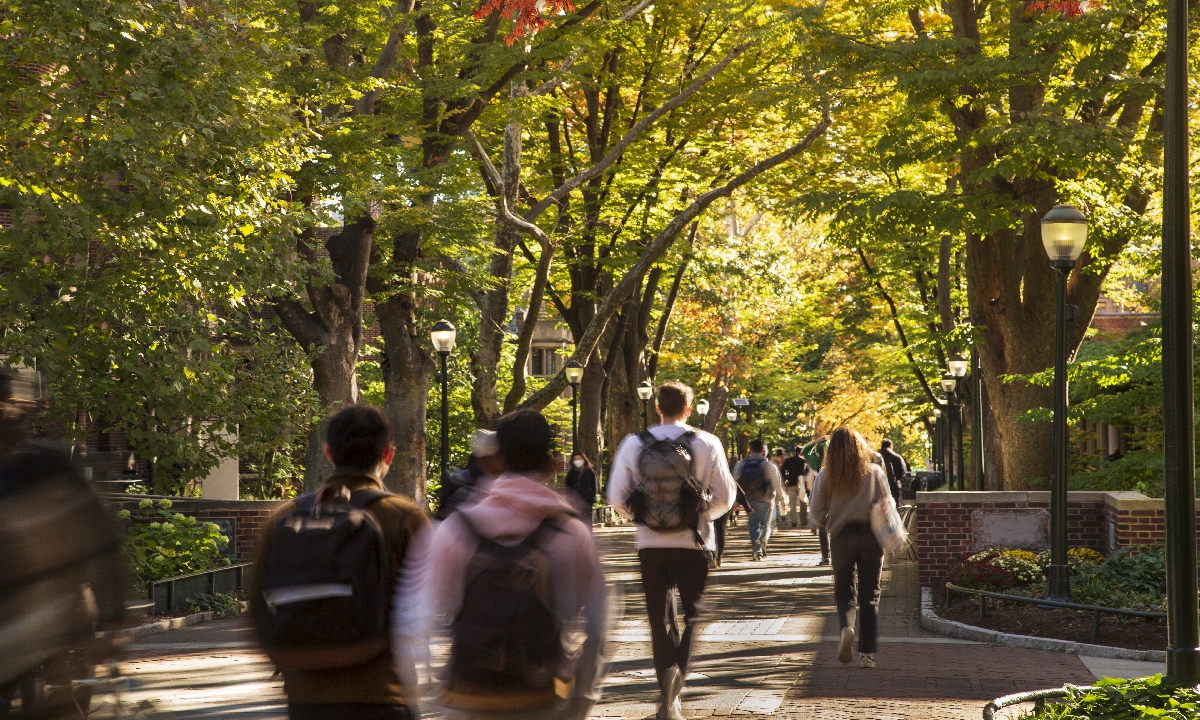
Photo: VCG
Four affected Chinese students have filed a lawsuit after the US government revoked the visas of at least 529 students, faculty members, and researchers from 88 US universities as part of a large-scale deportation effort, China Central Television reported. Clay Zhu, the attorney who is representing the case, told the Global Times that he has filed a motion which could restore the students' visa status if granted.
"We filed a motion for a Temporary Restraining Order (TRO) with the local court on Tuesday," said Zhu, attorney and managing partner at DeHeng Law Offices' Silicon Valley office.
Typically, a judge will issue a decision within a few days. If the motion is granted, it could potentially lead to the visa status of all affected international students be restored, he added.
Earlier reports by CCTV on Saturday confirmed that the US State Department has been manually terminating records in the Student and Exchange Visitor Information System (SEVIS) without formally notifying most universities or students of the cancellations.
This sweeping action has heightened anxiety among international students and scholars, who were already in a vulnerable position. Advocates of international education warn that such measures could diminish the ability of US institutions to attract students from abroad. In 2024 alone, the US issued over 400,000 student visas, Shanghai-based media outlet the Paper reported.
The four students from the Chinese mainland are enrolled at the University of California, Berkeley; Columbia University; Carnegie Mellon University; and the University of Cincinnati, said Zhu, noted that they are pursuing different fields of study, including architectural design and STEM disciplines. However, all four are facing the revocation of their student visas.
One of the plaintiffs is expected to graduate next month, while another is set to complete their studies in three to four months, according to Zhu. The visa cancellations have brought about a series of pressing issues, such as whether they must immediately leave the US and whether they will be able to continue their academic programs.
"As far as I know, there are dozens of international students in similar situations. We've created a group chat to stay updated in real time," a PhD student surnamed Wang, majoring in robotics who studied in the US, told the Global Times on Tuesday. Wang added that several attorneys he contacted noted many US lawyers are currently involved in litigation over international students' visa revocations.
"We filed the lawsuit on April 11 in a federal court in California. It is intended to protect the rights of all affected international students, not just the four plaintiffs," Zhu explained.
Zhu further explained that the four Chinese students, acting as plaintiffs, are suing US government officials, arguing that their visa cancellations were made without notice, a hearing, or evidence. The government cited vague national security concerns and, in some cases, referenced outdated or withdrawn traffic citations and minor domestic disputes. The lawsuit alleges that these actions are discriminatory, targeting the plaintiffs based on their immigration status, nationality, or race, and that the arbitrary and inconsistent conduct violates the US Administrative Procedure Act (APA) and constitutional guarantees of due process and equal protection under the law.
Zhu also noted that the lawsuit contends that the US federal government's actions violate the US Constitution and other laws, demanding an immediate halt to the unlawful conduct and the full restoration of legal status for all affected students.
"Over this past weekend, we reached out to the international student community to gather information. So far, 36 international students from 30 different universities across the US have submitted written declarations," Zhu said. He also noted the backgrounds of these students: 31 are from the Chinese mainland, one from China's Taiwan region, three from Iran, and one from India. Zhu further stated that all of these written declarations have already been submitted to the court.
In addition to the four Chinese students, Phoenix TV reported Monday that Liu Xiaotian, a Chinese PhD student at Dartmouth College, had his visa revoked on April 4. He later appealed to the court and was granted a temporary reinstatement order.
Zhu said that, to his knowledge, there have been two prior cases of individual Chinese students suing the US government. He hopes this new lawsuit involving four plaintiffs will result in a broader outcome benefiting all affected students.
The recent wave of visa reviews and cancellations targeting international students aligns with the broader policy agenda of the current US administration, which aims to curb both legal and undocumented immigration and pressure universities to address what it labels rampant anti-Semitism on campus. For Chinese students and scholars in particular, the pressure is especially intense, Zhu added.
It was previously reported that Chairman of the US House "Select Committee on the CCP" John Moolenaar sent letters to presidents of six US universities on March 19, requesting information on details regarding the enrollment of Chinese national students to be submitted before April 1.
In response, Chinese Foreign Ministry spokesperson Mao Ning stated on March 20 that Chinese students account for about a quarter of international students in the US. Education cooperation not only expands student exchange and deepens mutual understanding between Chinese and Americans but also contributes to America's economic prosperity and scientific and technological progress. Both sides have benefited from such cooperation.
We urge the US to stop brandishing national security as a false pretext and protect the legitimate and lawful rights and interests of Chinese students in the US. The US should not take discriminatory and restrictive measures against Chinese students, said Mao.




